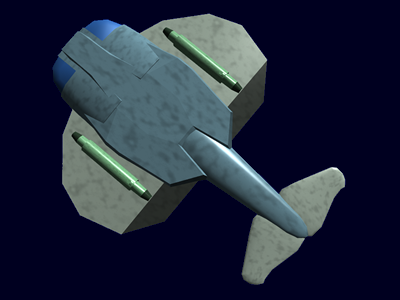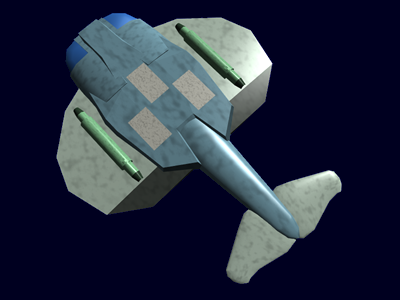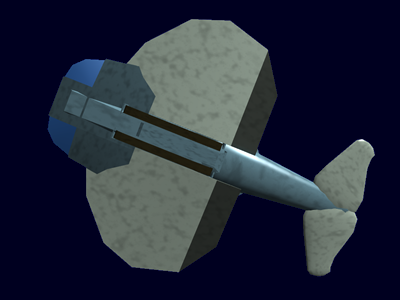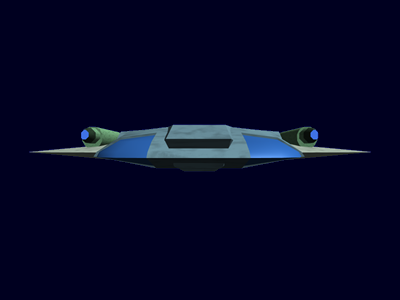Table of Contents
Variable Configuration Mission Adaptive Drone - Marine
The Ke-O7-1a Variable Configuration Mission Adaptive Drone is a multifunction drone that became available in YE 31.
About the VCMAD-M
Organization Using This item: Star Army of Yamatai, Scientific Studies Service Type: Multipurpose marine drone Nomenclature: Ke-O7-1a Designers: Ketsurui Zaibatsu Research and Development teams, Star Army Research Administration Manufacturers: Ketsurui Zaibatsu, Star Army of Yamatai Entered service: YE 31
Description
The VCMAD-M is the latest offering by Ketsurui Zaibatsu for use by the Star Army of Yamatai. Original development for the systems was tactical in nature, but with the recent changes in the Star Army of Yamatai the role of the device was expanded for exploration and possible civil use.
The VCMAD-M has a durandium and titanium frame, and its exterior is layers of durandium and titanium panels to handle the pressure on the hull.
Operation
The VCMAD can be deployed autonomously. It will perform the specified mission objective by the best means possible. It is has standard evasion tactics as part of its programming. The VCMAD can also be controlled via Telepresence using either Armor Integrated Electronics System (AIES) or the Ke-M2-E3000 Leader Support Pack, or SPINE interface on a ship.
The VCMAD-M is designed for maximum maneuverability in the water. It features two high speed impeller jets for propulsion, and has a flexible tail section. The tail section is covered in a dense Neutral_buoyancy polymer. It is capable of moving in the same manner as marine mammals. It can propel the VCMAD-M slowly through the water.
In the event of catastrophic damage or failure, the VCMAD will self-destruct.
The VCMAD-M drone uses various mission modules to change its purpose. The VCMAD-M modules plug into its three bays.
VCMAD-M with mission bays highlighted.
Specifications (Default)
Length: 2 meters (6.74 feet) Width: 1.5 meters (5.05 feet) Height: .25 meters (.84 feet)
Speeds
Treads: 10 kph (6 mph) Tail: 16 kph (10 mph) Impeller jets: 100 kph (60 mph)
Operational time: 36- 48 hours
Launch and Recovery
Preparation for launch
The VCMAD-M must be prepared for launch by installing the desired mission modules for the desired task.
Launch
The VCMAD-M can be launched from the ground provided there are not barriers between it and the water. It initially starts out using the retractable treads, when the drone is fully immersed the treads retract and the drone switches to either the impeller jets or the tail for propulsion.
It can be launched from a ship provided there is a ramp that it can traverse to the water. The VCMAD-M can be air dropped into the water from a height no more than 100 meters and a speed of 300 kph or less. (Exceeding these conditions can damage the VCMAD-M.)
Recovery
The VCMAD-M can be recovered by returning to the launch point. It can either climb back up a ramp or the shore. It is also possible to lift the VCMAD-M out of the water using cables.
VCMAD-M bottom view with treads deployed.
Damage Capacity
See Damage Rating (Version 3) for an explanation of the damage system.
- Hull: 2 PA scale
Components
Note: All components in the drone are equipped with anti-tamper devices. Only Ketsurui Zaibatsu trained technicians may service them.
Ke-O7-E3100 Avionics
The drone uses a miniaturized Compact Integrated Electronics System (CIES) computer based on the one in the Ke-M2-E3000 Leader Support Pack. It has additional sensors for underwater location.
- Sonar/echo location
Ke-O4-G3000 Power cells (3)
The drone carries three Ke-O4-G3000 power cells, two are for normal operation. The third one is for emergency power in the event of a failure of one of the primary cells.
Ke-O7-P3100 Impeller jets (2)
The VCMAD-M primary propulsion system is a pair of reversible impeller jets. Which allow the VCMAD-M to travel at high speeds in the water.
Ke-O7-P3101 Retractable treads (2)
These treads allow the VCMAD-M to maneuver in/out of the water. Once the VCMAD-M is fully immersed the treads retract to improve the VCMAD-M streamlining.
Ke-O7-P3102 Anti-grav buoyancy
This unit generates a low level anti-grav field. This is used to adjust the boyancy of the VCMAD-M only. It is not capable of lifting the drone.
Ke-O7-P3103 Articulated tail
The tail section consists of the following. A titanium skeletal structure based on marine mammals. The skeleton is overlaid with synthetic muscles and neural fibers. All of this is covered in a thick non-permeable Neutral_buoyancy polymer.
VCMAD-M front view
Mission bays (3)
The mission bays provide, power and control connections to the Compact Integrated Electronics System (CIES), have removable panels to accommodate module features such as cameras, antennae, etc.
Mission Modules
Ke-O7-E3101-lc Live capture package (Aquarium)
Purpose: Capture live marine specimens, and contain them in a sample of their natural environment. The containment units maintain the temperature and pressure the sample was gathered, and maintains proper oxygenation. The unit can hold 19 liters or approximately 5 gallons of water. Specimens are captured via a 15 cm (6 inch) wide suction tube.
Ke-O7-E3101-mp Manipulator package (Snatcher)
Purpose: The manipulator package features a pair of arms and sample storage container. The arms can be used to pick up objects for collection or to move items.
Ke-O7-E3101-ld Limpet Deployer (Delivery boy)
Restricted to Star Army of Yamatai usage only. Purpose: The Ke-O7-3101-ld is a delivery mechanism for limpet devices which are attached to the exterior of objects. It is capable of carrying two types of devices. Both limpet devices secrete Molecule solution when they make contact with the target. This bonds the device to the object.
Ke-O7-E3101-ac Audio conduction device
This device allows communication via conduction. It can be used to eavesdrop on a structure, or vessel. Or it can be used as an emergency communications device when dealing with a damaged vessel under water. Range of transmission without the VCMAD-m relaying is 1 km.
Ke-O7-W3100 Mine
This is a shaped charged designed to breach under water structures and vessels. Detonation can be either remote or timed.
Damage Capacity
See Damage Rating (Version 3) for an explanation of the damage system.
Damage: 2 Armor scale.
Ke-O7-E3101-ss Side Scanning Sonar (Mapper)
Purpose: The Side-scan_sonar allows the VCMAD-M to efficiently image large sections of the sea floor. It can be used to detect and identify submerged objects. It can also be used for Maritime_archaeology. It has two modes of operation, low and high frequency. Low frequency mode provides longer range, while high frequency provides a higher quality image but at shorter range.



